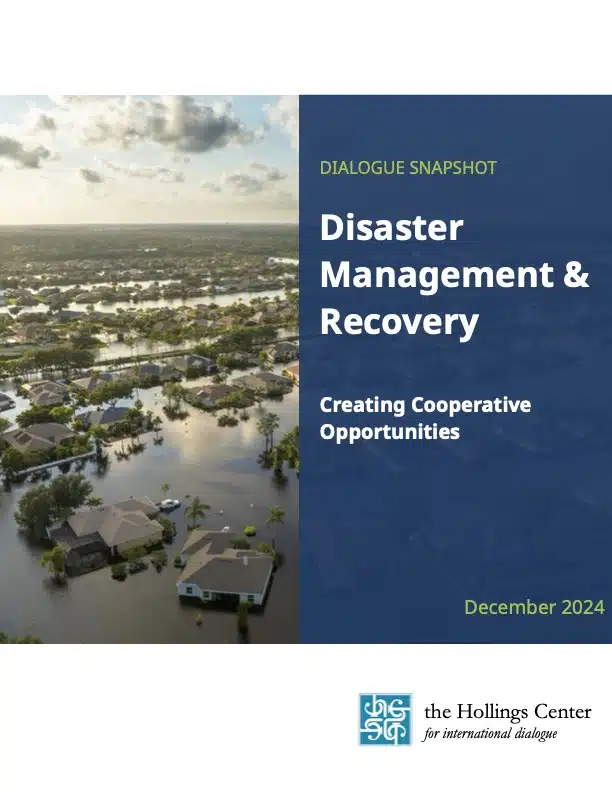DIALOGUE SNAPSHOT REPORT
March 2024
Istanbul, Türkiye
Dialogue Summary
Disaster management and recovery, whether for natural or human-induced crises, expose vulnerabilities in planning and response, often worsening economic and human security. The COVID-19 pandemic highlighted global deficiencies in disaster management while offering opportunities for international cooperation amidst geopolitical challenges. The Hollings Center and the University of Central Florida convened a global dialogue in Istanbul to address disaster management practices, focusing on policy, governance, the water-energy-food (WEF) nexus, private sector engagement, and the importance of local and international collaboration.
The discussions highlighted key global frameworks, such as the Sendai Framework for Disaster Risk Reduction and the Grand Bargain. Participants emphasized the need for flexible, context-specific approaches to better integrate these guidelines into national policies. Through case studies from countries like Türkiye, Syria, and Bangladesh, they explored various successes and challenges, particularly in balancing centralized and decentralized responses. The importance of local capacity building, promoting equity, and improving data utilization were identified as essential factors for enhancing disaster resilience in different contexts.
Additionally, the dialogue examined emerging strategies, including the WEF nexus and private sector engagement. While participants recognized the potential of innovative technologies like GIS tools, AI, and blockchain, they stressed the importance of adapting these technologies to local needs. Engaging communities and private companies in disaster planning, alongside fostering strategic partnerships, emerged as critical to addressing vulnerabilities and enhancing preparedness. In conclusion, participants agreed that a shared commitment to equity, capacity building, and effective communication across all stakeholders is essential for advancing global disaster management efforts.
Key Takeaways of the Disaster Management & Recovery Dialogue
Global Cooperation and Frameworks: Effective disaster management requires international cooperation, even amidst geopolitical challenges. Frameworks like the Sendai Framework for Disaster Risk Reduction offer essential guidelines, but implementation remains difficult. Context-specific approaches are necessary, particularly in conflict zones, to ensure national and local responses are properly resourced.
Integration of National and International Policies: Combining national and international policies is essential for effective disaster response. Case studies from Bangladesh, Türkiye, and Syria show that decentralized systems work well, but balancing centralized and local responses is crucial. Strengthening local capacity is key to improving resilience.
Technological Innovation and Community Engagement: Technologies like GIS, AI, and blockchain can enhance disaster management, but must be adapted to local needs. The private sector and local communities play vital roles in preparedness and recovery. Better data sharing, transparency, and addressing vulnerabilities in marginalized populations are essential for resilience.
Private Sector and Community-Led Approaches: Effective disaster management depends on balancing private sector interests with public good. Companies should see disaster management as a proactive investment. Local knowledge and community-led initiatives are crucial, as seen in Puerto Rico and Morocco, where decentralized responses proved effective.
Focus on Equity and Capacity Building: Addressing equity and involving vulnerable groups in disaster planning is critical. Mental health support for both affected individuals and aidworkers is increasingly important. Long-term capacity building, through training and data sharing, is essential for improving disaster preparedness and response worldwide.



